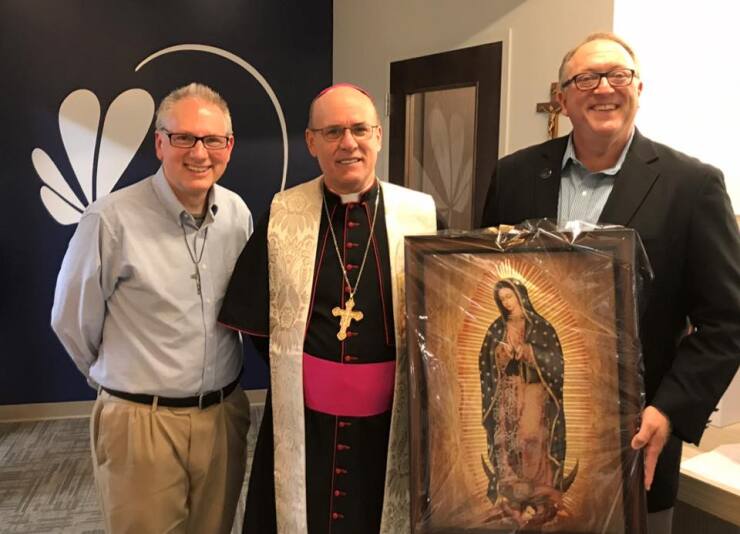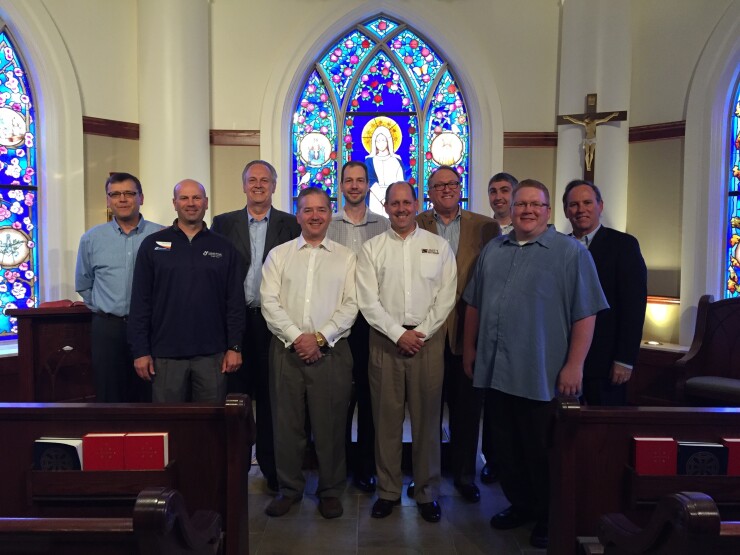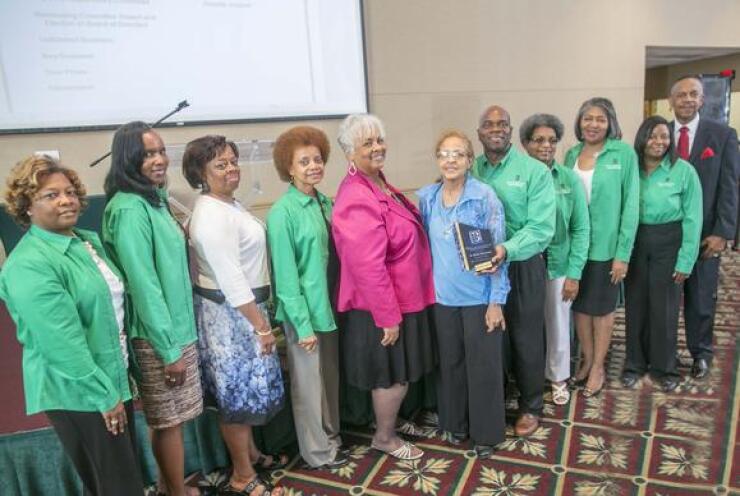Want unlimited access to top ideas and insights?
For some credit unions, saving money and saving souls go hand-in-hand.
There are a few hundred faith-based credit unions in America today, and they share a great deal with their secular counterparts – the majority of them are small or mid-size institutions, many of which are or minority-designated or certified as community development financial institutions. Keeping up with the compliance burden is also a struggle for lots of them, as is staying on top of technology.
Yet there is plenty that sets them apart. For starters, many work within church buildings or multiple churches within a denomination. In some cases, staff may be made up primarily of volunteers and they may not be open five days a week, or their hours may be dependent upon having access to the facility where they are housed.
“Yet, they still have some of the most competitive loan products and best rates that I’ve seen,” said Pamela Owens, SVP of organizational development and capacity building at the National Federation of Community Development Credit Unions. Owens works with the Federation’s 30 faith-based member institutions, which are all Christian credit unions based primarily in Harlem, as well as some in Chicago and throughout the south.
Called to credit unions
Many who work at faith-based CUs are as evangelical about the movement as they are about Christianity itself.

Carole Wight says she was “called by God” into the credit union movement in 1992, and now she leads Holy Rosary Credit Union, which serves the Catholic Diocese of Kansas City-St.Joseph in Missouri. Wight became president and CEO of Holy Rosary CU in 2008, and she says she never wants to go back to a non-faith-based credit union.
“One of the problems we have in the financial services industry is not enough people working with integrity,” she said. “The opportunity for service at Holy Rosary is so much greater than it is elsewhere.”
While the credit union’s board members are not all Catholics, they all are people of faith. Wight herself is a member of Community of Christ, an American-based church with roots in the Latter Day Saint movement.
“My faith denomination believes in a peaceable kingdom on earth with no poor among them,” Wight said, quoting some of the tenets of the Community of Christ’s basic beliefs.
Because of Holy Rosary’s connection to the church and a reputation in the community that dates back to 1943, said Wight, it’s sometimes easier for social services organizations to trust the credit union in initiatives like alternative payday lending. “At first they thought we were trying to make money off of them,” Wight said about one social service agency in particular. “But someone from my faith was on [the] board. She went back and told them that that’s not what we’re about.”
Bound together by faith
Not all credit unions with a religious background, however, are tied to a particular church or denomination. For example, Notre Dame Federal Credit Union is the largest credit union with a Catholic affinity, but it has a multiple common bond charter rather than a faith-based charter.
“However, our roots to the Catholic Church are undeniable,” said Tom Gryp, Notre Dame CEO and president. “We do what credit unions do because we want to be the hands and feet of our Lord.”

In 2016, Notre Dame and 10 other credit unions formed the Catholic Credit Union Association so Catholic credit unions across the country could come together once a year.
Since then, Holy Rosary has joined the association.
“[Wight] is like a crusader to get poor people out of debt,” said Robert Kloska, CCUA administrator and director of national partnerships at Notre Dame FCU. “We [Notre Dame] are literally 20 times larger than her credit union but yet she comes to our meetings and we all want to hear her talk because she brings a beautiful focus to the mission.”

The Catholic Church itself has a rich history in the credit union movement, with a priest having been involved in founding the very first credit union in the U.S. (St. Mary's Bank in New Hampshire) and even many popes having expressed public support for the industry. During the 20th century, the National Catholic Welfare Council had a standing committee of bishops that promoted the creation and flourishing of parish credit unions.
Still, Catholic credit unions have shrunk in the same way the rest of the movement has, declining from more than 800 in the 1960s to nearly 100 today.
Technology may save Christian CUs
The decline of religious credit unions could be at least partially reversed by the advent of mobile banking.
Fifteen years ago, the Episcopal Diocese of New York considered creating a credit union, but the proposal was scuttled because there weren’t enough funds to build brick-and-mortar branches. Today, the diocese is on its way to chartering a credit union that could go mobile in New York City and across the state.

“What’s changed is that now people bank on their phones, and it’s possible for a lot of people to do their banking without a face-to-face interaction,” explained Rev. Jennifer Reddall, who leads the Church of the Epiphany in Manhattan and the organizing committee for the New York Episcopal Credit Union. “So we’re looking at the possibility of having a mobile unit that could go around to different churches in the region to provide services.”
Reddall envisions the credit union’s mobile unit visiting different parishes on outreach days, similar to when a parish operates its food pantry program. Currently, Reddall and others on the organizing committee are visiting different parishes in the city to raise funds for operating capital.
As Reddall began to research which parts of New York City might be in need of banking services, she found that the Episcopal Church has a lot to offer in terms of financial services.
“We have a lot people who are bankers and who are people of financial means, and we have a lot of people who are not,” she said, adding that the group was “very blessed” by Trinity Church Wall Street and New York Episcopalian Bishop Andrew Dietsche, “who both put out $250,000 in startup capital.”
Lack of IT may sink them
But even if the fledgling New York Episcopal Credit Union has a shot thanks to technology, IT matters remain a challenge for plenty of other faith-based CUs.
Two years ago, Todd Sipe, president and CEO of Thrivent Federal Credit Union, began reaching out to other Christian CUs to create a coalition to address technological struggles and other hurdles faith-based CUs have. From those discussions came what is called the Faith Collective, a group of nine Christian credit unions that meets twice a year to discuss the unique issues they face.
“Some of the things we’ve talked about include a CUSO model around big data and data analytics or digital marketing,” Sipe said. “We’ve also considered something for IT or back office functions to drive scale and efficiencies for our credit unions.”
Thrivent FCU is the credit union of Thrivent Financial, a member-owned fraternal organization for Christians. Out of Thrivent Financial’s 2.5 million member base, Thrivent FCU has about 50,000 members as a single select employee group credit union.
“There has to be a better path than consumerism and overbuying and overspending to the point where it’s tough to live a life of contentment and generosity,” Sipe said. “There’s never been a better time for churches and Christian credit unions to work together.”
One credit union, many hats
Just as there continue to be single-SEG credit unions, many Christian CUs still are sponsored by and serve only one church with small operations.
Houston-based Brentwood Baptist Church Federal Credit Union is only open for a few hours two days a week because it only serves Brentwood Baptist Church’s congregation.
“Some church members say that it’s good that we’re not open every day because they can’t get their money, and they like that,” said Kay Rosbure, manager and treasurer of the credit union.

Since the church sponsors the credit union, the CU is only open on Sundays from 9 a.m. to 1 p.m. and Wednesdays from 5:30 p.m. to 7:30 p.m. There are no ATMs, but the credit union does offer ACH. With a combination of paid employees and volunteers, the credit union is able to keep expenses low, and about 1,000 of the church’s 4,000 members are part of the credit union.
“When you talk about a faith-based chartered financial institution, budgets are limited,” said Donald Queen, the credit union’s chairman. “Our church provides us a place to meet. But the dollars we bring in — once we have paid for staff, insurance and other fees — are very limited.”
The credit union began as a vision from the church’s pastor, Rev. Joe Samuel Ratliff, who wanted the church to be able to meet the financial needs of his congregation, and also saw it as the church’s responsibility to provide its members with financial education.
“In 1993, there was a recommendation that churches should not only be feeding their members spiritually but also helping their members from a lifelong financial planning standpoint,” Queen said.
In following biblical principles about parenting, the credit union also has programs to teach children in the church about financial wellness.
“The kids step up to the counter to make their deposit,” Queen said. “Then they track how much their saving in their savings book.”
For many at Brentwood Baptist Church, there is a comfort that their church is behind their finances.
“When members who haven’t made their loan payments see us, we don’t say anything,” Rosebure said with a laugh. “But when they see us, they know.”





